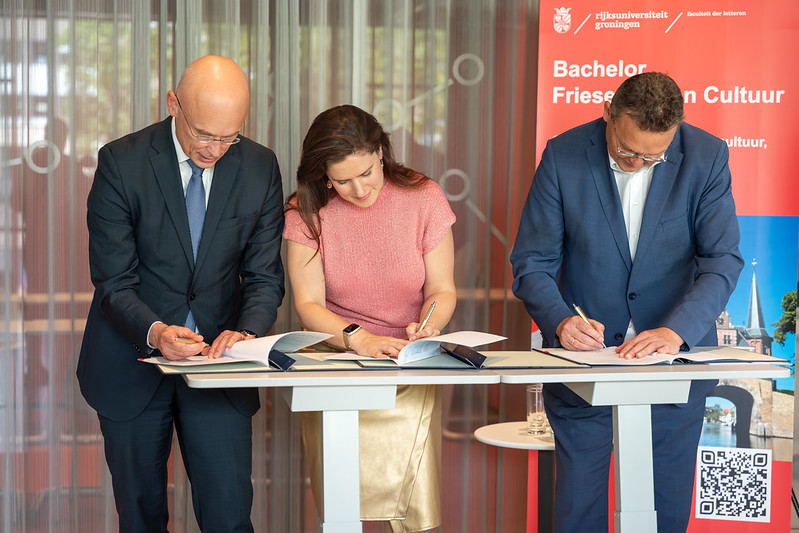New Bachelor's Program in Frisian to Launch in Groningen in 2026
Starting in September 2026, students will be able to pursue a full bachelor's degree in Frisian at the University of Groningen. This development follows the signing of a new agreement on July 10 by the University of Groningen (UG), the Ministry of Onderwijs, Cultuur en Wetenschap (OCW), the Ministry Binnenlandse Zaken en Koninkrijksrelaties (BZK), and the Province of Fryslân.
Languages thrive when they are spoken, read, and studied. Both the Dutch Parliament and the Royal Netherlands Academy of Arts and Sciences (KNAW) have repeatedly highlighted the importance of university-level education and research in Frisian language and culture. In recent years, this academic presence has faced challenges. Provincial Executive Eke Folkerts remarked, “Frisian needs an academic backbone. With this agreement, we are jointly investing in the final stage of the continuous learning pathway. This reflects both our shared responsibility and the commitments outlined in the Administrative Agreement on Frisian Language and Culture.”

About the Bachelor's Program
The new Frisian Language and Culture bachelor’s program will be housed within the Faculty of Arts at the University of Groningen. Dean Thony Visser stated, “We’re proud to be launching a high-quality, sustainable, and accessible degree program. This marks an important step in securing a stronger academic presence for Frisian language and culture.”
The curriculum will cover the Frisian language, culture, regional landscape, and society. The program is designed not only for full-time majors, but also to attract a wider audience through elective courses. Visser explained, “Our aim is to give as many students as possible the opportunity to engage with the academic study of this beautiful language and its rich cultural heritage. Alongside the bachelor’s program, we’re also introducing a university-wide minor that will be open to all students.”
Frisian as an Official Language
Frisian holds official language status in the Netherlands. National and provincial governments share legal responsibility for its protection and promotion. Every four years, the Dutch government and the Province of Fryslân establish joint policy agreements. The current policy cycle (BFTK 2024–2028) includes dedicated funding for the development and continuation of a Frisian bachelor’s program.
In line with these commitments, the parties will present the “Convenant inzake de samenwerking tussen het Ministerie van Onderwijs, Cultuur en Wetenschap, het Ministerie van Binnenlandse Zaken en Koninkrijksrelaties, Provincie Fryslân en de Rijksuniversiteit Groningen ter organisatie, bevordering en instandhouding van een volwaardig, duurzaam en toegankelijk wetenschappelijk bachelorprogramma Friese taal en cultuur” on July 10.
A Continuous Learning Path
The introduction of the bachelor’s program and its associated research will complete the continuous learning path for Frisian—an important goal of the Taalplan Frysk 2030. Through this plan, the Province of Fryslân and educational partners are working to strengthen Frisian language education at every level, from early childhood to university and teacher training programs at NHL Stenden.
After completing the bachelor’s program, students will be able to continue their studies through master’s programs in fields such as history, media studies, linguistics, heritage studies, and academic teacher training in Frisian. Visser added, “To support and grow academic talent in the Frisian field, we plan to regularly offer PhD tracks and postdoctoral research opportunities - ideally in close collaboration with other institutions committed to the future of the Frisian language.”
More news
-
19 January 2026
Digitization can leave disadvantaged citizens in the lurch
-
13 January 2026
Doing good in complex situations
